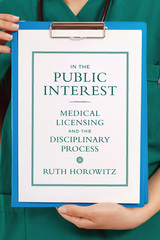
Winner of the American Sociological Association Sociology of Law Section 2013 Outstanding Book Award
How do we know when physicians practice medicine safely? Can we trust doctors to discipline their own? What is a proper role of experts in a democracy? In the Public Interest raises these provocative questions, using medical licensing and discipline to advocate for a needed overhaul of how we decide public good in a society dominated by private interest groups. Throughout the twentieth century, American physicians built a powerful profession, but their drive toward professional autonomy has made outside observers increasingly concerned about physicians’ ability to separate their own interests from those of the general public.
Ruth Horowitz traces the history of medical licensure and the mechanisms that democratic societies have developed to certify doctors to deliver critical services. Combining her skills as a public member of medical licensing boards and as an ethnographer, Horowitz illuminates the workings of the crucial public institutions charged with maintaining public safety. She demonstrates the complex agendas different actors bring to board deliberations, the variations in the board authority across the country, the unevenly distributed institutional resources available to board members, and the difficulties non-physician members face as they struggle to balance interests of the parties involved.
In the Public Interest suggests new procedures, resource allocation, and educational initiatives to increase physician oversight. Horowitz makes the case for regulations modeled after deliberative democracy that promise to open debates to the general public and allow public members to take a more active part in the decision-making process that affects vital community interests.

A bottom-up investigation of the broken system of professional licensing, affecting everyone from hairdressers and morticians to doctors, lawyers, real estate agents, and those who rely on their services.
Tens of millions of US workers are required by law to have a license to do their jobs—about twice as many as are in unions. The requirements are set by over 1,500 industry-specific licensing boards, staffed mainly by volunteers from the industries they regulate. These boards have enormous power to shape the economy and the lives of individuals. As consumers, we rely on licensing boards to maintain standards of hygiene, skill, and ethics. But their decisions can be maddeningly arbitrary, creating unnecessary barriers to work. And where boards could be useful, curbing harms and ensuring professionalism, their performance is profoundly disappointing.
When Rebecca Haw Allensworth began attending board meetings, she discovered a thicket of self-dealing and ineptitude. Drawing on hundreds of hours of interviews with board members and applicants, The Licensing Racket goes behind the scenes to show how boards protect insiders from competition and turn a blind eye to unethical behavior. Even where there is the will to discipline bad actors, boards lack the resources needed to investigate serious cases. The consequences range from the infuriatingly banal—a hairdresser prevented from working—to the deeply shocking, with medical licensing boards bearing considerable blame for the opioid crisis and for staffing shortages during the COVID epidemic. Meanwhile, unethical lawyers who are allowed to keep their licenses are overrepresented among advocates working with the most vulnerable groups in society.
If licensing is in many arenas a pointless obstacle to employment, in others it is as important as it is ineffective. Allensworth argues for abolition where appropriate and outlines an agenda for reform where it is most needed.
READERS
Browse our collection.
PUBLISHERS
See BiblioVault's publisher services.
STUDENT SERVICES
Files for college accessibility offices.
UChicago Accessibility Resources
home | accessibility | search | about | contact us
BiblioVault ® 2001 - 2024
The University of Chicago Press









